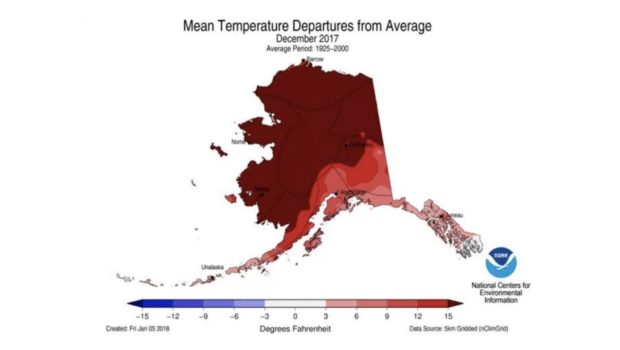Headline News:
- The latest weather reports from Alaska are alarming. In December, 2017, the average temperature in Alaska was 19.4° F according to a report from NOAA. That average is 2.1º F more than the previous high temperature record set in 1985. For the month, Alaska was 15.7º F warmer on average, compared to data going back to 1925. [CleanTechnica]

Above average temperatures in Alaska
- Data from both the Energy Information Administration and Rhodium Group show that solar and wind power represented 94.7% of the US net new electricity capacity (15.8 GW out of 16.7 GW) added in 2017. However, that is mainly because fossil fuel power continued to fade away, as 11.8 GW of utility-scale fossil fuel plants closed. [Engadget]
- “Is An Oil Price Spike Inevitable?” • The oil glut is over, at least when it comes to US commercial inventories. Brent touched $70 last week, and discoveries continuing to sit at record lows, so there is a chance that $70 a barrel is only the beginning. One thing, however, is certain: The oil market is notoriously difficult to predict. [OilPrice.com]
- “Edible insects: Do insects actually taste any good?” • Edible insects are often portrayed as something of a sustainable super-food, an environmentally friendly alternative to livestock. But who is already eating them and do they actually taste any good? (Spoiler: Hornet larvae taste like sweet mussels when cooked and seasoned properly.) [BBC]
- A massive oil tanker that sank off the coast of China could affect marine life for decades, experts say. The 900 foot-long tanker was carrying about a million barrels of ultra-light crude oil at the time of the collision. China’s State Oceanic Administration said several oil slicks have already been found, including one covering over 22 square miles. [CNN]
For more news, please visit geoharvey – Daily News about Energy and Climate Change.
posted first on Green Energy Times
No comments:
Post a Comment